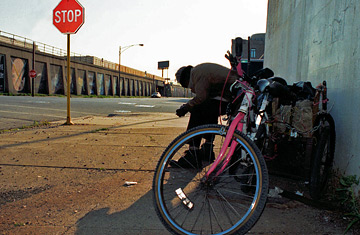
A homeless man rests in an industrial Chicago neighborhood..
(3 of 4)
"The Mayor's actions are not helping but hurting the situation. The system is completely hemorrhaged, backed up, since there is not enough housing on the other end," said Samir Goswami, an associate policy analyst with the homeless coalition. "We are not going to end homelessness in Chicago by 2012 simply because our well-intentioned Mayor signed a well-intentioned plan."
Chicago has some particularly daunting obstacles in its battle against homelessness. Some 30% of its children live in poverty; 10% of families live in extreme poverty; the homeless population is guessed at tens of thousands; and more than 100,000 people are considered at risk. Worse, the coalition's same report found Chicago fared pathetically when stacked against other large cities in spending. San Francisco, the study found, spent more than $100 per homeless person; New York invests $37 per capita; Philadelphia, $11; Chicago, $3.
The city quibbles with the numbers, and there is much argument over what constitutes homelessness. Those who do not have their own housing, yet are able to "double up" with friends or family, are not considered homeless by the city or the federal government. Yet the coalition believes this population should be counted because they are at an equal risk.
